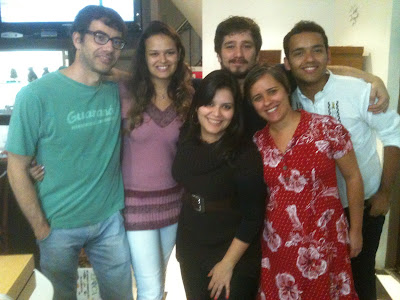Very worth seeing. Apart from what it shows about the old "trying to find the perfect girl/boy" thing, the movie tells a lot about creating characters in fiction.
I loved the part at the end when Calvin, trying to explain to an audience how Ruby became real, talks about the Catcher in the Rye and says that Holden Caulfield was real too. In a way, he was, he is. As many other characters are, for lots of readers. How could they not be for the writers themselves?
Here you'll find comments and stories about my stay in Brazil; translations of Brazilian songs, poems, short stories and pieces of news; photographs. Also, some film and book reviews. In Spanish, Catalan, Portuguese and English.
Wednesday, October 31, 2012
Wednesday, October 24, 2012
Recién vi la que llaman "mejor escena del cine argentino"
Es muy buena y sigue siendo actual. Ahora vale para países como España y Catalunya*.
*Los amigos brasileños no me creen cuando digo que la tasa de pobreza en Catalunya está en el 29,5%.
*Los amigos brasileños no me creen cuando digo que la tasa de pobreza en Catalunya está en el 29,5%.
Sunday, October 21, 2012
L'Ana avui fa un any! :D
Felicitats, Ana, estimada!
La Nelia m'envia aquestes fotos: "En Primicia Mundial

 , pel tiet Roger". (Gràcies, guapa!)
, pel tiet Roger". (Gràcies, guapa!)
La Nelia m'envia aquestes fotos: "En Primicia Mundial
Sunday, October 07, 2012
Mineiro é tudo de bom (eu já sabia, agora sei mais)
Friday, October 05, 2012
Theatre and neuroscience and fuck the PUC
O assunto está mais do que superado, mas cada vez que leio uma coisa destas (e é com frequência) dá vontade de ir lá na FALE e xingar alguém. Isto é o Sérgio que me envia. Sublinho o que estava, quase com as mesmas palavras (tira Theatre, bota Literature), em meu projeto de tese.
PS:
Um dos main themes que estarão em tela no congresso de Teatro e educação de Paris 2013.
3. Is social neuroscience a revolution for education?
Recent research on the brain seems to confirm artists’ and educators’ insights about the significance of “feeling” and “acting” in the acquisition of knowledge through empathy. Theatre and ‘Drama for Learning’ methods stimulate learning processes cognitively and affectively:
- What can neuroscience bring to Theatre, Drama and Education and to the training of artists and educators? And conversely, what can Theatre and Drama bring to neuroscience?
- Are there policies in place that support the joint development of arts and science?
- How can Drama and Theatre improve interpersonal development between people and cultures?
- Within the context of Drama / Theatre and Education, what do we mean by empathy and respect?
Um pouco de tietagem...
Wednesday, October 03, 2012
A kind of painful progress
I've been doing some research today - for my book. Started with "penguins", went on with "Antarctica", and then hit this Harper's monologue, again. Sixteen years have passed since I saw the play, thrice, in Barcelona. It still mesmerizes me.
Subscribe to:
Comments (Atom)








